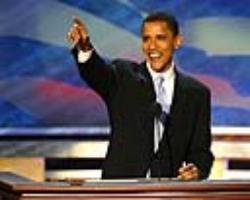Urban youth ministers could be uniquely positioned to lead national youth ministry organizations if they seize opportunities to develop themselves as theologians and strategic leaders.
This notion has come to me as I’ve watched the political campaign of Barack Obama. Now, before some of you reading get scared, I’m not using this column to endorse Obama for president of the United States of America. But we can learn something about the future of youth ministry leadership through the rise of Obama as the first mainstream presidential candidate who happens to be an African American.
He is running a campaign that in many ways is post-black.
Ability to Lead Anyone
A post-black leader has the ability to lead within the American mainstream as well as black America.
The Reverends Jesse Jackson and Al Sharpton both ran for president as black candidates. Both are black activists who came out of the black church. Most black leaders have difficulty moving to national leadership, often because European-Americans limit their influence and authority. (“You’re not my leader, you’re the leader of your people.”)
Will white people follow black leaders? I believe the answer is yes, when the leaders make the decision to become post-black leaders.
In addition to Obama, Oprah Winfrey is a good example of a post-black leader. White women love her, but she also has figured out how to be a leader to African Americans, as well. (For example, she has starred in and produced movies including the recent must-see movie, The Great Debaters starring Denzel Washington. She has also started a school in South Africa and has donated millions of dollars to historically black colleges and universities.)
A Brand New World
Because we are living in an ever-expanding society, new challenges and questions will be raised around leadership within the political arena, the corporate sector and, yes, even church and parachurch organizations.
Who will be able to lead in a hip-hop, multi-ethnic, multicultural, technological world? Who will have the skills to advance the Kingdom of God in this world?
Here is the challenge. For the most part, leadership has been shaped by European-American males. Whenever a minister gains major national influence, the question is eventually raised, “could this be the next Billy Graham?” (See what I mean?)
But the world is changing and there is a need for leadership that can speak, strategize, and vision-cast within that world. Many urban youth ministers know how to work within a fast-paced, multi-ethnic, urban and technological world. What many urban youth ministers lack is resources, formal education, and networks which lead them to paths of executive leadership.
History to Be Made
I was one of the lucky ones. I grew up in the black church and in hip-hop. I am post-Civil Rights, to the degree that I grew up in integration. I began working with mostly African-American youth, but as the neighborhood began to diversify, I adapted. The parents didn’t always understand me, but their kids were more connected to hip-hop culture than they knew. Because I leveraged my natural abilities with seminary, executive leadership training and cross-cultural education, I now find myself in a unique position.
Now I am a post-black leader. I am the senior pastor of an urban, multi-ethnic, evangelical, hip hop church in Minneapolis. The church is 55 percent European-American, 32 percent African-American and the rest Asian and Latino. I humbly mention that some perceive me as a national leader.
Just as history could be made this during November’s election, the time is coming soon when history could be made at Youth for Christ, Fellowship of Christian Athletes, and Young Life. One day, history could be made at Wheaton, Taylor, and Bethel colleges. History could be made at Fuller and North Park seminaries.
And history could be made in the local church, as emerging, ethnic leaders plant healthy missional and multi-ethnic churches which transform youth, families, and communities—if urban youth ministers seize the moment.
EDITOR’S NOTE: Much has happened since this column was written. Controversial sermons by Obama’s pastor, Jeremiah Wright, brought charges of racism. Then Obama delivered “A More Perfect Union,” his speech on race that has been seen by 4 million people on YouTube.com. Obama is not a perfect role model for The Post-Black Leader. No one is. But his campaign continues to raise issues we all need to confront.




